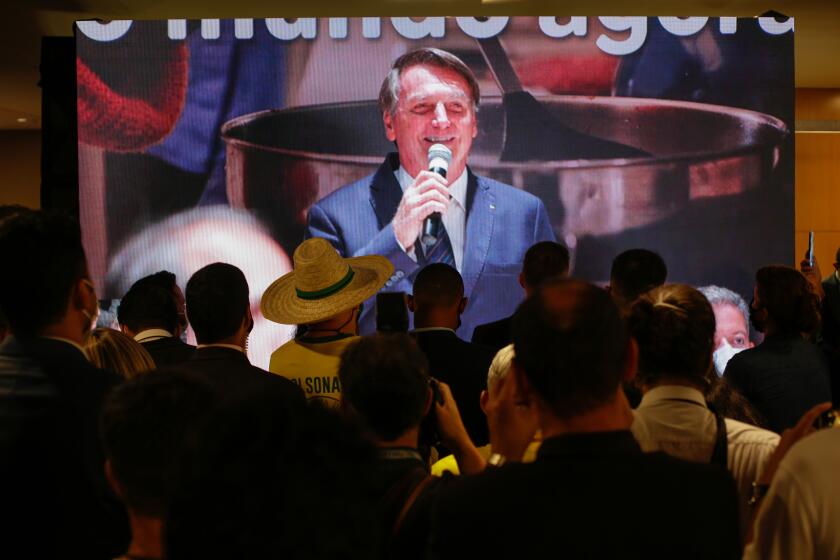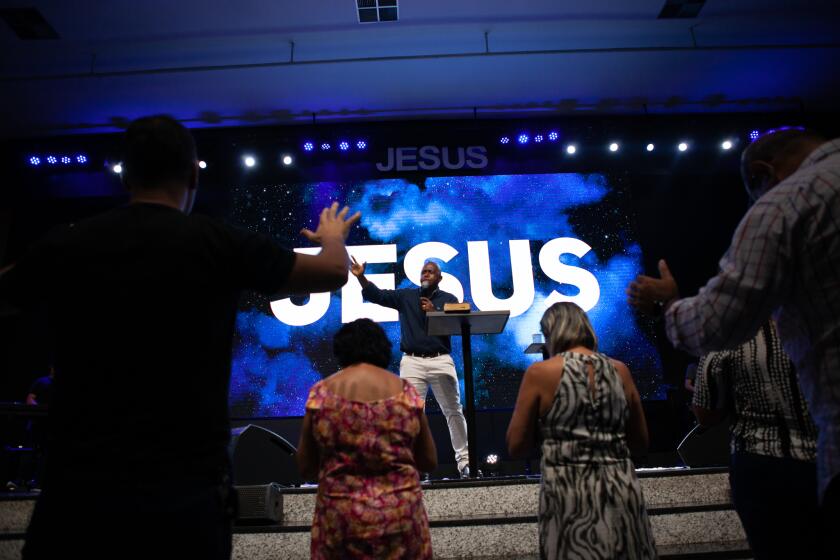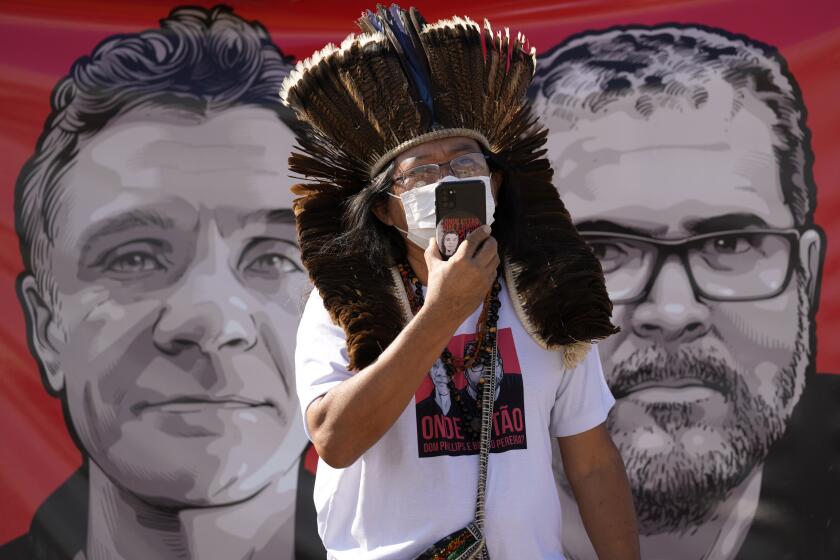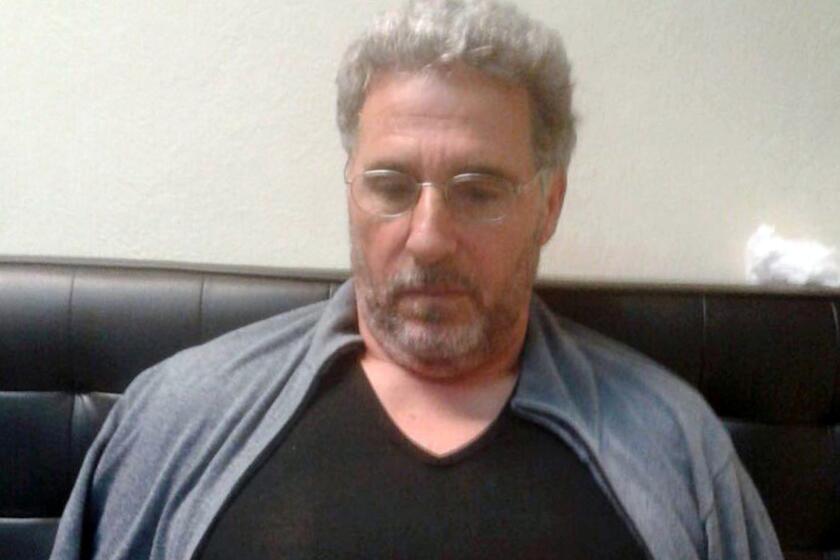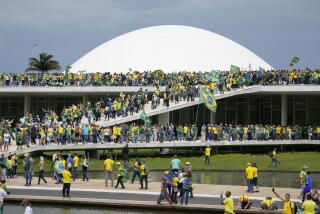Brazil’s Lula appeals for calm after ally’s killing fuels fears of political violence
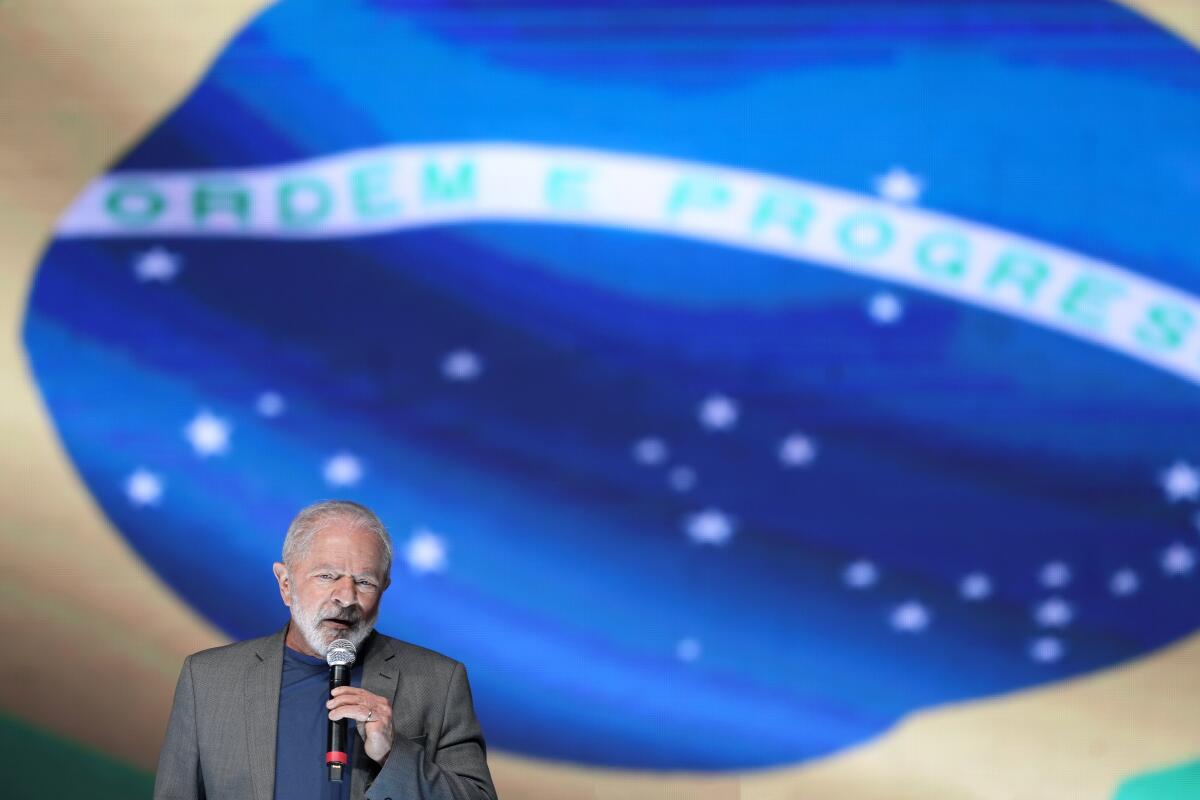
- Share via
SAO PAULO — Under tight security and wearing a bulletproof vest, former Brazilian President Luiz Inacio Lula da Silva attended a political rally in the capital city of Brasilia. After passing through a metal detector, hundreds of Workers’ Party backers gathered near the stage, where Lula called for them to remain peaceful and avoid confrontations with adversaries.
Lula’s plea this week reflects growing concerns among politicians, authorities and voters about Brazil’s presidential campaign and October election. The leftist leads all polls to return to the office he held from 2003 to 2010, but far-right incumbent Jair Bolsonaro has suggested that he may not accept the results and urged his allies to arm themselves.
Last week, Supreme Court Justice Edson Fachin, the chairman of the country’s electoral court, warned in a presentation in Washington that incidents worse than the insurrection at the U.S. Capitol could happen in Brazil this year. Last July, CIA Director William Burns told two Bolsonaro ministers that the president should stop attacking the electoral system.
Electoral tensions rose again Saturday night, when Marcelo Arruda, a Lula backer and Workers’ Party official, was shot dead by a man who, witnesses told the police, had shouted support for Bolsonaro before pulling the trigger. The investigation is ongoing, but the killing reignited fears of political violence on the campaign trail, which officially begins in August.
“We don’t need to fight. Our weapon is our calmness, the love we have inside of us, our thirst of making people’s lives better,” Lula said at the rally. “We don’t have to react to provocations. If anyone teases you, tell them to go bite themselves. Go home and take care of your families. That’s the lesson we need to teach.”
Members of Lula’s campaign and Bolsonaro’s presidency said they would not discuss security details with the media.
From soured friendships to Bannon advising the president, Brazil looks a lot like the Trump-era U.S.
Ten months before the next presidential election, Brazil is more polarized than at any point in recent memory.
Bolsonaro, who was severely injured when he was stabbed in the abdomen at a campaign event in 2018, has presidential security at all times, including military personnel and local police.
Lula can count only on private security until his bid is validated by a party convention, which can take place until Aug. 5. After that, Brazil’s federal police will protect him.
The federal police said in a statement that 300 officers would be among those protecting candidates.
The Workers’ Party has taken several measures to avoid conflicts between supporters and to ensure the former president’s security. Before the rally in Brasilia, the party leadership published guidelines asking supporters to move in groups, bring an extra shirt of neutral color and avoid conflict with adversaries.
Evangelicals have become a major force in Brazilian politics. They now make up 30% of the population — double their share two decades ago.
“Don’t argue or attack any provocateur. Heroic actions might cause unnecessary risks to you and to your fellow supporters,” the party said.
Two members of the Lula campaign, speaking on condition of anonymity because they were not allowed to discuss the matter publicly, confirmed to the Associated Press that the leftist leader has been wearing bulletproof vests in public events since the beginning of July.
Lula supporters were thoroughly searched at the entrance of the pavilion where the Brasilia event took place. But the long lines were small concern for people like artisan Alessandra Melo, 50. She believes the former president’s life is at risk, and that supporters like her could also be targeted.
“I fear a lot for Lula’s security. He likes to be close to the people. I worry for him, being out there amid all this violence,” Melo said.
Before he disappeared in Brazil’s Amazon rainforest, Bruno Pereira was working on his latest project to help protect Indigenous lands and people.
Smaller incidents against Lula supporters have been reported in recent weeks. On June 15, drones dropped liquid with a pungent smell on leftists attending an event in Uberlandia, in the state of Minas Gerais. Last week, a man threw a rudimentary explosive made with small-scale fireworks at a Lula rally in Rio de Janeiro.
No injuries resulted from either incident, and police have made arrests in both cases.
Lula was arrested in the wide-ranging “Car Wash” corruption probe as he led polls to win the 2018 presidential elections. His conviction also barred him from running. But the cases against him were quashed after the country’s Supreme Court ruled that Judge Sergio Moro was biased against the leftist, and he was freed from jail.
Brazilian politics is no stranger to violence. In 2018, Rio Councilwoman Marielle Franco and her driver were shot to death in their car while driving downtown.
Rocco Morabito was convicted two decades ago in absentia of drug-trafficking as part of the fearsome ‘Ndrangheta organized crime syndicate.
Bolsonaro, under pressure to condemn Arruda’s killing last weekend and any political violence, said Tuesday that there was no justification for the slaying. He has also called members of Arruda’s family. In his recorded phone call, he suggested that they tell the media he shouldn’t be blamed for the murder.
“Since almost all of the press is on the left, they are basically putting this guy’s actions on my back,” the president told two of Arruda’s brothers. “The left has made this a political issue.”
Arruda’s killing occurred in the southern state of Parana, a Bolsonaro stronghold. Since then, many authorities have expressed worries about the risks of violence involving supporters of both candidates.
Melina Risso, a program director at the Rio-based security think tank Igarape Institute, said candidates will stop worrying about their safety only if Bolsonaro openly condemns those committing violent actions.
“Bolsonaro sometimes takes some steps back when these incidents appear, but that is only until the news cycle is over,” Risso said. “The risks are very real, and there is no sign that will change until the election is over.”
More to Read
Sign up for Essential California
The most important California stories and recommendations in your inbox every morning.
You may occasionally receive promotional content from the Los Angeles Times.
